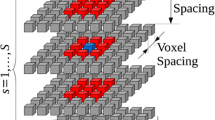Abstract
The goal of this paper is to present the development of a new image mining methodology for extracting Magnetic Resonance Images (MRI) from reduced scans in k-space. The proposed approach considers the combined use of Support Vector Machine (SVM) models and Bayesian restoration, in the problem of MR image mining from sparsely sampled k-space, following several different sampling schemes, including spiral and radial. Effective solutions to this problem are indispensable especially when dealing with MRI of dynamic phenomena since then, rapid sampling in k-space is required. The goal in such a case is to make measurement time smaller by reducing scanning trajectories as much as possible. In this way, however, underdetermined equations are introduced and poor image extraction follows. It is suggested here that significant improvements could be achieved, concerning quality of the extracted image, by judiciously applying SVM and Bayesian estimation methods to the k-space data. More specifically, it is demonstrated that SVM neural network techniques could construct efficient priors and introduce them in the procedure of Bayesian restoration. These Priors are independent of specific image properties and probability distributions. They are based on training SVM neural filters to estimate the missing samples of complex k-space and thus, to improve k-space information capacity. Such a neural filter based prior is integrated to the maximum likelihood procedure involved in the Bayesian reconstruction. It is found that the proposed methodology leads to enhanced image extraction results favorably compared to the ones obtained by the traditional Bayesian MRI reconstruction approach as well as by the pure Neural Network (NN) filter based reconstruction approach.
Preview
Unable to display preview. Download preview PDF.
Similar content being viewed by others
References
Stijnman, G.H.L.A., Graveron-Demilly, D., Wajer, F.T.A.W., van Ormondt, D.: MR Image Estimation from Sparsely Sampled Radial Scans. In: Proc. ProRISC/IEEE Benelux workshop on Circuits, Systems and Signal Processing, Mierlo (The Netherlands), pp. 603–611 (1997)
Smith, M.R., et al.: Application of Autoregressive Modelling in Magnetic Resonance Imaging to Remove Noise and Truncation Artifacts. Magn. Reson. Imaging 4, 257 (1986)
Barone, P., Sebastiani, G.: A New Method of Magnetic Resonance Image Reconstruction with Short Acquisition Time and Truncation Artifact Reduction. IEEE Trans. Med. Imaging 11, 250 (1992)
Dologlou, I., et al.: Spiral MRI Scan-Time Reduction through Non-Uniform Angular Distribution of Interleaves and Multichannel SVD Interpolation. In: Proc. ISMRM, 4th Meeting, N.Y., p. 1489 (1996)
Haykin, S.: Neural Networks: A comprehensive foundation, 2nd edn. Prentice Hall, Englewood Cliffs (1999)
Author information
Authors and Affiliations
Editor information
Editors and Affiliations
Rights and permissions
Copyright information
© 2005 Springer-Verlag Berlin Heidelberg
About this paper
Cite this paper
Karras, D.A., Mertzios, B.G., Graveron-Demilly, D., van Ormondt, D. (2005). Improved MRI Mining by Integrating Support Vector Machine Priors in the Bayesian Restoration. In: Perner, P., Imiya, A. (eds) Machine Learning and Data Mining in Pattern Recognition. MLDM 2005. Lecture Notes in Computer Science(), vol 3587. Springer, Berlin, Heidelberg. https://doi.org/10.1007/11510888_32
Download citation
DOI: https://doi.org/10.1007/11510888_32
Publisher Name: Springer, Berlin, Heidelberg
Print ISBN: 978-3-540-26923-6
Online ISBN: 978-3-540-31891-0
eBook Packages: Computer ScienceComputer Science (R0)




